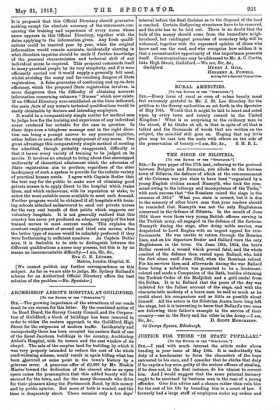THE SIEGE OF SILISTRIA.
[To THE EDITOR OF TEE "SPECTATOR."]
SIR,—In your paper of the 17th inst., referring to the protocol between Bulgaria and Rumania, you allude to the fortress town of Silistria, the defence of which at the commencement of the Crimean war you state to have been "organized by a young English civilian named Nasmyth, who took the com- mand owing to the lethargy and incompetence of the Turks," with such success that "the Russians raised the siege in the summer of 1854." What you state is correct, but it is due to the memory of other brave men that your readers should be reminded that Nasmyth was not the only Englishman concerned in the defence of Silistria. In the month of June 1854 there were three very young British officers serving in the Turkish army, all engaged in the defence of the fortress. Nasmyth during the siege, after doing noble service, was despatched to Lord Raglan with an urgent appeal for rein- forcements. He was unable to return through the Russian lines, and on his departure Butler and Ballard were the only Englishmen in the town. On June 13th, 1854, the brave Butler received a wound which proved fatal, and the whole conduct of the defence then rested upon Ballard, who held the fort alone until June 22nd, when the Russians retired. For his services then and afterwards during the war Ballard from being a subaltern was promoted to be a lieutenant- colonel and made a Companion of the Bath, besides obtaining the Turkish Order of the Medjidieh and a gold medal from the Sultan. It is to Ballard that the press of the day was indebted for the fullest account of the siege, and with the characteristic modesty of a brave man he said as much as he could about his companions and as little as possible about himself. All the actors in the Silistrian drama have long left the stage, but it is interesting to know that Ballard's two sons are following their father's example in the service of their country—one in the Navy and the other in the Army.—I am, Sir, &e., D. SCOTT MONCRIEFF. 24 George Square, Edinburgh.


















































 Previous page
Previous page